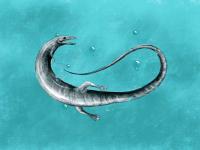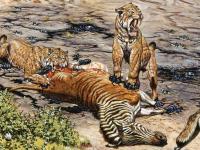Fossils From Cat With ‘Steak Knife’ Fangs, Found in Yukon

Two fossils help provide new insight into the mysterious, and extinct, scimitar cat.
A couple of rare fossils found in Yukon have scientists sinking their teeth into the mysterious history of a once-formidable predator — the scimitar cat.
And according to new research published in the journal Current Biology, the fossils suggest the now-extinct animal once ranged across the Northern Hemisphere.
“There’s only about 20 fossils that have ever been found of this cat in Alaska or Yukon, and that’s in over 100 years of fossil collecting,” said Yukon government paleontologist Grant Zazula.
“It’s kind of an enigma … we don’t know a lot about this animal.”

What researchers do know is that scimitar cats were the stuff of nightmares — built to kill, with long front limbs and short back limbs. “Good for pouncing,” Zazula said. That combined with large, serrated fangs.
“Imagine your house cat with steak knives coming out of its mouth, but it’s about 400 pounds,” Zazula said.
“This is a branch of the cat family tree that basically diverged — it went off on its own path on the family tree about 20 million years ago — and they’re completely unrelated to all living cats today.”
Mining for fossils
The two Yukon fossils that became the focus of the latest research were found decades apart, on mining claims on the Sixty Mile River, and Dominion Creek. Studied alongside other scimitar cat fossils, researchers now believe North American scimitar cats were the same species as the European ones.
Previously, scientists believed there were separate species on the two continents.

“We now know, genetically, this was one wide-ranging species that lived all the way, basically, from England to Texas,” Zazula said.
The new research is just another example of how Yukon, rich in ice age fossils, is playing an outsized role in paleontological research, Zazula says.
“These fossils that we find in the Yukon … have global significance. They’re not just things that end up on dusty shelves,” he said.
“For me, it’s a real honour to be part of that, and be a little guy from the Yukon getting a chance to kind of engage in the international scientific world because of the cool things that we have in the ground here.”
Source: www.cbc.ca








